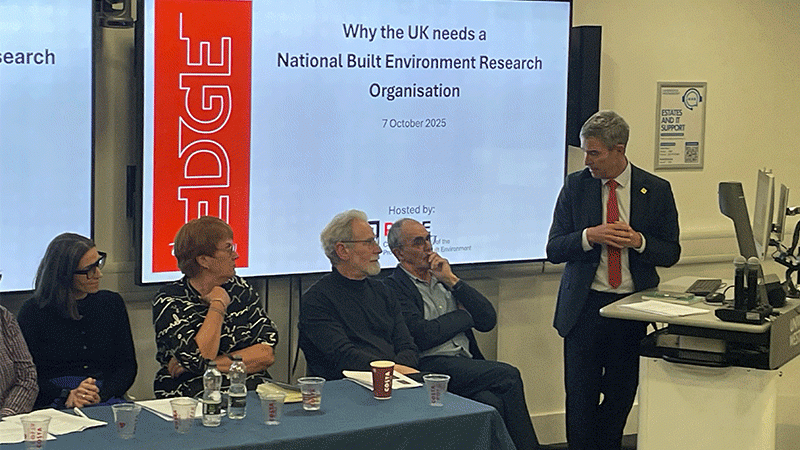The University of Westminster’s Centre for the Production of the Built Environment (ProBE) recently hosted a debate exploring ways to collaborate to improve the spaces around us – from housing and schools to transportation networks and play areas. The discussion focused on research and highlighted the need for a new model to connect and share research across universities, private sector research institutes and other public sector bodies in the UK and Europe to help the industry to thrive.

The event was held on 7 October and was organised by Edge, a multidisciplinary campaigning built-environment think-tank and network. Vice-Chancellor and President of the University Professor Peter Bonfield led the opening address and spoke on the importance of higher education for the future of the industry.
The panellists included a variety of built environment experts from across the country, reflecting the diversity of expertise that shapes the industry, representing architecture, engineering, construction products, social housing, policymaking and academia. Together they questioned what a new public sector research organisation in the UK might look like and how this could be created. Speakers collectively agreed that there is a need for the public sector to have a role in enabling and coordinating research that will inform the future direction of the industry.
Until 1997, the UK’s Building Research Establishment was a nationalised body with workshops, hangers and other large-scale facilities for carrying out building research. Three decades later, as the panel explored, the role for the public sector might be quite different, especially given the urgency of addressing climate change, the fragmentation of the construction industry and its number of different professional and other bodies.
The debate also explored the current fragmentation of research and development, the need for policy coordination, as well as the risks involved in not having a public body, highlighting the Grenfell tragedy as an example of the consequences of disjointed research and policy.
Dr Dan Greenwood, Reader in Political Economy and Public Policy, said: “This was an important opportunity for the Centre for Study of the Production of the Built Environment at University of Westminster to host a debate that is of pivotal importance for UK construction and related sectors, especially in the context of the transition to net zero.”
This debate directly contributes to the United Nations Sustainable Development Goal (SDG) 9: Industry, Innovation and Infrastructure. Since 2019, the University of Westminster has used the SDGs holistically to frame strategic decisions to help students and colleagues fulfil their potential and contribute to a more sustainable, equitable and healthier society.
Learn more about the Centre for the Production of the Built Environment at the University of Westminster.


